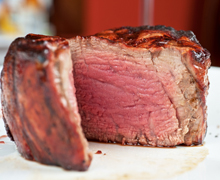
Red meat is on the no-eat list for many wanting to maintain heart health but a new study shows it could actually come off that list. Researchers at Penn State University discovered lean red meat paired with the Mediterranean diet actually reduced the heart disease risk for study participants.
"When you create a healthy diet built on fruits, vegetables, and other plant-based foods, it leaves room for moderate amounts of other foods like lean beef," said researcher Jennifer Fleming. "There are still important nutrients in beef that you can benefit from by eating lean cuts like the loin or round, or 93% lean ground beef."
A randomized, controlled trial of with varying amounts of lean beef added to the Mediterranean diet led to a reduction in LDL cholesterol particles compared to the control of the typical American diet. The Mediterranean diet periods included olive oil as the predominant fat source and three to six servings of fruits and six or more servings of vegetables each day. The beef was either considered lean or extra lean.
"This study highlights the importance of including lean beef in a Mediterranean dietary pattern that can yield heart-healthy benefits," said fellow researcher David Baer.
Red meat consumption has been associated with an increased risk for cardiovascular disease in other studies. But some researchers say the reason remains unclear because not enough work was put into separating other diet and lifestyle choices from the meat consumption.
Other factors from previous studies include the combining of fresh meat with processed meats in the red meat category. Processed meats differ in many ways from fresh meat and some theorize additional ingredients like sodium may contribute to the detrimental effects found.
The 59 study participants rotated between the different diets for a total of four weeks at a time with a one-week break in between. Red meat was added daily in measurements of 0.5 ounces, 2.5 ounces, which is considered the typical amount consumed by Americans, and 5.5 ounces.
Researchers used special nuclear magnetic resonance (NMR) technology to measure the number and size of lipoprotein particles. "This is important because there is growing evidence to suggest that LDL particle number is more strongly associated with cardiovascular disease risk than total blood LDL concentrations alone," Fleming said. "Moreover, we were able to identify changes in apolipoproteins, specifically apoB, which are also associated with increased CVD risk."
The data showed a lower number of LDL cholesterol for the participants during all three Mediterranean diet periods compared to the average American diet. And the levels during the weeks of 0.5 ounces and 2.5 ounces daily were significantly lower.
"Our study helped illustrate the benefits associated with a healthy Mediterranean dietary pattern that embodies balance, variety and the inclusion of nutrient-rich components, which can include low to moderate amounts of lean beef," Fleming said.
Click here to read more in the American Journal of Clinical Nutrition.
